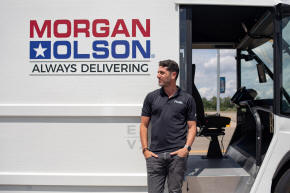Burning cash, commercial EV startups race to deliver vehicles
 Send a link to a friend
Send a link to a friend
 [August 09, 2022] By
Nick Carey, Lisa Baertlein and Ben Klayman [August 09, 2022] By
Nick Carey, Lisa Baertlein and Ben Klayman
NUNEATON, England (Reuters) - A handful of
commercial electric vehicle (EV) startups are burning through cash fast,
racing to bring vans or trucks to market before the funds run out or
customers choose to buy from legacy automakers like Ford Motor Co or
General Motors Co .
Boosted by investor hunger to create the next Tesla Inc, a clutch of
commercial EV makers on both sides of the Atlantic have gone public via
reverse mergers with special-purpose acquisition companies (SPACs),
raising hundreds of millions of dollars as they sought to emulate Elon
Musk's success. These include Arrival Inc, Canoo Inc, Lordstown Motors
Corp, Electric Last Mile Solutions Inc (ELMS) and REE Automotive Holding
Inc.
But investors have soured on EV startups and their ability to compete
with legacy carmakers, sending their shares to a fraction of their peak
prices. This has raised the pressure to produce working vehicles fast if
they want to raise fresh funds in an industry where launching a single
vehicle can cost $1 billion.
"It's vitally important at this stage to get vehicles into customers'
hands," said Daniel Barel, chief executive of Israeli electric chassis
maker REE Automotive, which has run vehicle tests with customers near
Detroit and will unveil a UK prototype van this week. "Only then can
they make a real decision to buy."

REE's chassis use "corners" or standalone in-wheel electric motors, with
brakes and steering housed in all or some of the wheels of an EV that do
not need axles or powertrains, freeing up more space inside a van.
To get to market faster, REE has tapped legacy suppliers like American
Axle for electric motors and Italy's Brembo for brakes. Companies like
EAVX and Morgan Olson, units of commercial vehicle body maker JB
Poindexter & Co, will provide standardized bodies for REE's U.S. trucks.
"We want to keep true to what we're about and let others bring their
expertise in for the rest," said vice president for engineering Peter
Dow at REE's engineering centre in Nuneaton, England.
The clock is ticking.
REE's shares are almost 90% below their July 2021 debut. The company had
$239 million in cash at the end of March and expects to invest up to
$120 million in 2022 to scale up for production in 2023.
"We're on track, we're on budget, we've got everything we need to take
it to the market," CEO Barel said while demonstrating a test vehicle
near Detroit, adding that REE has enough cash to last beyond the end of
2023.
Others have already struggled, however.
ELMS filed for bankruptcy liquidation in June, citing insufficient
funding, while Lordstown had to sell assets to Taiwanese contract
manufacturer Foxconn.
In May, Canoo disclosed "substantial doubt" about its ability to
continue as a going concern, but recently received a boost when Walmart
Inc ordered 4,500 vehicles.
Obtaining more cash could be tough.
"The market right now is not an ideal market to raise capital," said
Dakota Semler, CEO of Los Angeles-based Xos Inc, which already has 200
electric trucks operating on U.S. roads for customers including
Amazon.com Inc delivery contractors.

Xos had $132.7 million in cash at the end of March and can raise $125
million more via a share purchase deal with a unit of U.S. investment
firm Yorkville Advisors.
'TOUGH AT THE MOMENT'
Legacy automakers are turning up the heat.
FedEx Corp has 150 BrightDrop electric trucks running deliveries around
Los Angeles. "It feels like you're in the future now," FedEx driver
Nelson Granados, 28, told a Reuters reporter as he made deliveries
during a ride-along in a BrightDrop EV. FedEx has ordered 2,500
BrightDrop trucks, spurred by a combination of the 18-month-old
company's technology and GM's manufacturing muscle, FedEx's chief
sustainability officer, Mitch Jackson, told Reuters Potential new
entrants have taken note.
[to top of second column] |

Daniel Barrel, CEO of REE Automotive stands in front of an electric
vehicle on display at the American Center for Mobility in Ypsilanti,
Michigan, U.S. July 28, 2022. REUTERS/Emily Elconin

British EV startup Bedeo makes electric powertrains for vans for world No. 4
automaker Stellantis NV and said earlier this year it was talking to investors
about building its own vans.
Despite its track record - vehicles with Bedeo powertrains have clocked over 50
million km (31 million miles) - executives say investors are now wary of
competing with the likes of Ford's electric Transit van.
"A large-scale capital raise is tough at the moment," said Andrew Whitehead, CEO
of Bedeo unit Protean Electric.
Bedeo CEO Osman Boyner said the company will instead start converting existing
diesel vans later this year using Protean's in-wheel electric motors so they can
run in electric mode in cities with low-emission zones and diesel on longer
journeys.
Bedeo is also talking to legacy automakers about producing small, specialized
production runs of 5,000 or so vans for them.
"Big automakers don't want to do that in-house," Boyner said. "Those numbers are
too small for them, but they're big numbers for companies like us."
'LESS FAVOURABLE TERMS'
EV startups are cutting back.
Rivian said earlier this year that its $16 billion in cash as of the end of
March was enough to fund its second U.S. plant for $5 billion, targeted to open
in 2025, but it announced in late July that it would cut its workforce by 6% to
reduce costs.
Amazon has ordered 100,000 vans from Rivian, whose stock has fallen more than
80% from a peak hit shortly after its November 2021 initial public offering.
UK electric van and bus maker Arrival also plans to cut costs.
Arrival had $500 million in cash in mid-July, almost 45% down from roughly $905
million at the end of 2021. Its stock is almost 93% below its March 2021 debut.
Chief Financial Officer John Wozniak said in a statement that restructuring will
fund Arrival's operations until late 2023.

The startup has begun phased trials with United Parcel Service Inc, which has
ordered up to 10,000 Arrival vans.
"We believe that we will continue to access funding from a number of different
sources," Wozniak said. "However, the terms may be less favourable and the
amount and timing remains uncertain, which is why the company announced the
measures it is taking to preserve cash."
Startups that avoided going public via SPAC mergers are now waiting for the
market to improve.
In February Stockholm-based Volta Trucks raised 230 million euros ($235 million)
in funding to ramp up electric truck production.
Spokesman Duncan Forrester said Volta has prototype trucks in customers' hands
and is on track for series production in early 2023. It has an order book of
more than 6,500 trucks valued at around 1.4 billion euros.
Later in 2023, Volta will look to raise funds, either through fresh fundraising
or an initial public offering.
"From an investor perspective, that will be a different conversation because
we'll be able to demonstrate a track record of bringing vehicles to market,"
Forrester said.
($1 = 0.9770 euro)
(Reporting by Nick Carey in Nuneaton, England, Lisa Baertlein in Los Angeles and
Ben Klayman in Detroit; Editing by Matthew Lewis)
[© 2022 Thomson Reuters. All rights
reserved.]This material may not be published,
broadcast, rewritten or redistributed.
Thompson Reuters is solely responsible for this content.
 |